Sam. 33. They/them. Librarian. Side blog for my nerd time. Main blog: @hobbitinthelibrary
Don't wanna be here? Send us removal request.
Text
oral exam tips
I have at least one other post on exam tips, but they were mainly focused on giving tips on history exams. To me oral exams in academia have been the norm since high school, but I know that in other countries that might no be the case, so I decided to write down a list of advices coming from someone who is quite used to this kind of tests.
If you aren't used to having oral exams, you might need to change your study method, or at least add a few steps. I recently made a post entirely dedicated to my study method, which might be useful for this, but what I suggest is to add a step in which you review things out loud. What I would do is to just sit down with your notes or your materials and pretend to give a lecture on everything. Even better if you have a friend or family member to listen to you, because by having an active listener you will be forced to not skip stuff and have clear explainations, and they might ask you questions or clarifications. Those are always good because that might happen during the exam as well, but also it will help you memorizing those things. I recommend reviewing out loud multiple times. This way you will get more comfortable with the exposition of the topics you will be tested on, and you'll have a chance to find your own "voice".
by finding your own voice I mean finding a good compromise between using your own words to explain things, while still using the correct specific vocabulary of whatever topic you'll be tested on. This is fundamental. You are not there to recite a poem by heart, you are there to show you have understood the topic, that you sat with it and made it yours. You have to show you know how to clearly explain things but also reflect on it, making links with other things, and so on. At the same time there's some academic and specific vocabulary you want to include, because you are not in fact discussing the topic with a friend. So practicing out loud before the exam is good to find a good compromise between these two things.
I kind of mentioned it already, but it is absolutely fundamental to show that you understood the topic and not just memorized it. Whatever you do do not learn things by heart. It's better to be slightly insicure about a specific date, than to repeat your book word by word. And if you practice enough, and are comfortable enough with the informations in general believe me you can work around those things you can't remember perfectly well as you are being tested. Moreover your mark on the exam will be much higher than if you just learn things by heart.
on the very delicate topic of not remembering something specific you have been asked. Don't panic, you can still kind of save it. Whatever happens do not stay silent. There are several things you can do depending on whatever the question is, and I will later tell you a very specific example of something that happened to me. As I said do not panic, surely you will remember about some context on the topic so start by talking about that. As you are giving the context you might start to remember additionals informations, or you might build up enough informations to be able to logically guess whatever you are not remembering correctly. If you are half sure about something go for it, even if it's the wrong info if you contextualise it well enough you'll show you knew about that and it might just be read as a slip of you confusing two things. Now there might be situations in which the question is so direct that you can't do much, it happened to me once during my Greek history exam. I was asked the specific date of an event, and I could not for the love of the gods remember it. You know what I did? I told the professor, I cann't rememebr the exact date, but giving certain informations (that I then explained) I can tell you it was more or less in this half of this century. What I did was admit a fault, but while doing that I showed her that I knew what we were talking about it, I had enough informations on the matter to logically place it on the chronological line and contextualize it, and showed her that I can in fact work with the informations I studied. And at the end of my exam the professor complimented me on those exact things, saying she appreciated seeing me use my brain instead of midlessly memorizing informations I didn't understand.
So whatever happens do not stay silent. Anything is better than that.
Another potentially bad thing that might happen, and believe me it happened to me multiple times, is panicking so bad that you cannot get the words out, or confuse things. You know what happened everytime I found myself in that situation? The professor clearly saw me panicking, and told me to calm down, wait a couple of minutes, get my ideas in order and try again. And I got good grrades despite that in the end. You are under a lot of pressure, because you are giving an exam, and you have to be quick and ready instead of being able to reflect like with a written exam. Professors know that, and they keep it in mind, and they can tell when you are mixing things up because you are nervous, and not because you don't know things. I once had a professor look at me in the eye after i mixed up numbers on two dates twice in a row, and told me I know you know them take two deep breaths and try again. And I did. I have so many personal stories from my previous degree in which professors saw I was nervous and told me that it was okay I just needed to take a minute and breathe, and honestly that was exactly it. It was okay and I really needed to breathe, and then the exam when well.
The best tip I can give on answering questions is to balance the actual answer of the question with additional informations. You want to give context and add more infos to whatever has been asked to you, but you should also try not to lose focus on what was being asked. My personal way of doing this is to structure the answer in three parts: 1. general context that works as an introduction to the actual direct answer 2. the actual answer 3. further additions like more context, comparaisons and links with other topics or informations you had to study. This way you show off you know things, you make sure to show the professor you are not just rambling because you don't know the answer, and finally show you are comfortable enough with the informations to reflect on them and link them to other things. Ideally the professor will stop you while you are speaking, that in my experience is the best possible sign, because they are satisfied with your exposition and want to move onto other things.
So always build up on the answer to the question you have been asked. Never stop at just the information that serves as an aswer. You studied, it's your time to shine and make yourself proud.
Contextualizing your informations is absolutely fundamental no matter what, again because it shows you have a clear idea about what you are talking about. This can mean making a small introduction on the time and place, if you are an historian like me, or maybe give an introduction on the person you are talking about (whether they are an historical figure or a scholar you are talking about). Adding the little informations you weren't asked about is great. You are briefly mentioning an even and know the date? Add it in. Everything is a good addition.
Again I have definitely already mentioned in previous points but showing you are capable of reflect on the topics you are talking about is always a bonus. Make sure that when you are giving personal options or personal reflections you are stating this is your thought, but that is usually appreciated. After a good exposition of a topic you might even get the professor asking you your opinion on certain things. It happened to me multiple times, often I was asked to give an opinion of books I had to study for the exam, and that always prooved as an oportunity to add more informations and as I said show that I could make reflections of my own.
Last thing, that again kind of came out from other points, is that you want to show you are comfortable enough with the topic to be able to jump from one point to the other while reflecting on things or making comparaisons.
I am pretty sure I have forgotten something, but once again if you have specific questions I am happy to help, my inbox is always open. I know people who aren't used to oral exams are very scared of them, but as long as you try to approach it like a normal conversation on the topics you had to study, and you have practiced, things will be fine. To be quite honest with you after years of experience I'd say I very much prefer oral exams to written ones, because you can in a way shape the conversation and bring it to the topics you liked the most, know best. I hope this post was somewhat helpful to someone out there, and good luck if you are about to take an exam!
74 notes
·
View notes
Text
Original posts on study/journaling tips and more!
This is a masterlist with all my original posts linked to study tips, journaling, reading, and more. I will keep it updated in time, and I also included links to a few useful asks I have receved. I hope any of these might be helpful.
Study organization tips
What I do with bullet journal spreads I end up not using
Bullet journal weekly spreads ideas
5 simple daily habits that changed my life
music for studying reading and writing
Items I bought for university: worth it or not?
Tips on how to study history by an history student
How to read more
History exams tips by an history student
My writing journal
(Ask) how I annotate
(Ask) how I read non fiction books quickly
(Ask) how to remember names when studying history
Thesis writing tips from someone who is currently writing their thesis
My thesis notebook
(Ask) my process for writing a chapter of my thesis
(Ask) how I organize my bullet journal
(Ask) univeristy spreads in my bullet journal
(Ask) tips on reading and writing scientific articles
More thesis writing tips from someone who just finished writing their thesis
(Ask) on procrastination and planning tips for post gradute studying
(Ask) how I study
(Ask) tips on how to write the introduction of a research
(Ask) journaling tips
My reading routine
(Ask) tips on how to get out of a reading slump
10 books to get you out of a reading slump
(Ask) gift ideas for people who love journaling
Journaling 101: types of journals
Journaling 101: why you should journal
Journaling 101: journaling tips
Journaling 101: prompts and ideas
(Ask) easy Italian books for beginners
(Ask) how I learn languages + my language learning progress
How to get out of a reading slump
(Ask) how to use footnotes
(Ask) how I manage studying and time off to rest
My study method
How I take notes on non-fiction books
Oral exam tips
823 notes
·
View notes
Text
Make the most of the next two months
Get all your vaccines
Travel while we have a functioning DOT
Read and buy books on feminism, anti-racism, pro-lgbt
Attend drag shows
Don't skip any of your classes
Read and buy history books
Find your out-of-state networks
Learn to carry cash
Get birth control solutions
Support the Biden/Harris administration
Postpone large purchases and save money
Be careful of what you say online, like un-ambiguous attacks against the incoming administration, especially in spaces that contain your full name or personal information
Feel free to add on.
67K notes
·
View notes
Text
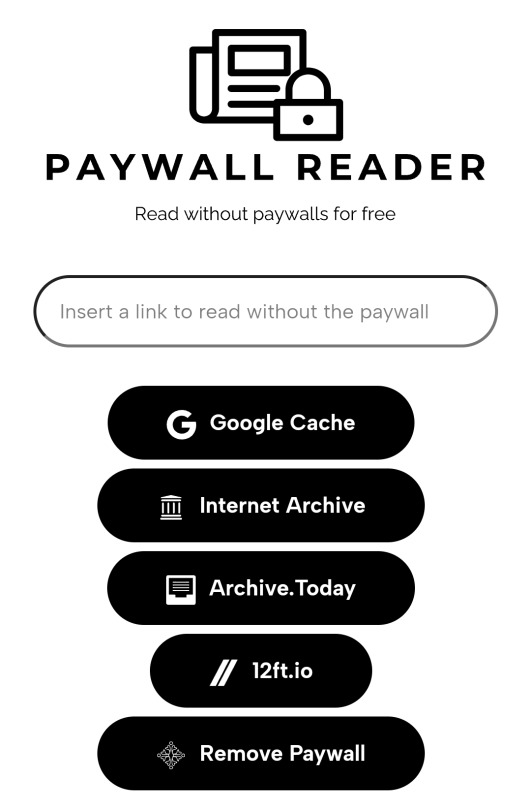
Dropping this here for anyone who may not already know about it. paywallreader.com
65K notes
·
View notes
Text
Google is going to start scraping all of their platforms to use for AI training. So, here are some alternatives for common Google tools!
Google Chrome -> Firefox
If you’re on tumblr, you’ve probably already been told this a thousand times. But FireFox is an open-source browser which is safe, fast and secure. Basically all other browsers are Chrome reskins. Try Firefox Profilemaker, Arkenfox and Librewolf! Alternatively, vanilla Firefox is alright, but get Ublock Origin, turn off pocket, and get Tabliss.
Google Search -> DuckDuckGo
DuckDuckGo very rarely tracks or stores your browsing data (though they have only been known to sell this info to Microsoft). Don’t use their browser; only their search engine. Domain visits in their browser get shared. Alternatively, you can also use Ecosia, which is a safe search engine that uses its income to plant trees! 🌲
Google Reverse Image Search -> Tineye
Tineye uses image identification tech rather than keywords, metadata or watermarks to find you the source of your image!
Gmail -> ProtonMail
All data stored on ProtonMail is encrypted, and it boasts self-destructing emails, text search, and a commitment to user privacy. Tutanota is also a good alternative!
Google Docs -> LibreOffice
LibreOffice is free and open-source software, which includes functions like writing, spreadsheets, presentations, graphics, formula editing and more.
Google Translate -> DeepL
DeepL is notable for its accuracy of translation, and is much better that Google Translate in this regard. It does cost money for unlimited usage, but it will let you translate 500,000 characters per month for free. If this is a dealbreaker, consider checking out the iTranslate app.
Google Forms -> ClickUp
ClickUp comes with a built-in form view, and also has a documents feature, which could make it a good option to take out two birds with one stone.
Google Drive -> Mega
Mega offers a better encryption method than Google Drive, which means it’s more secure.
YouTube -> PeerTube
YouTube is the most difficult to account for, because it has a functional monopoly on long-form video-sharing. That being said, PeerTube is open-source and decentralized. The Internet Archive also has a video section!
However, if you still want access to YouTube’s library, check out NewPipe and LibreTube! NewPipe scrapes YouTube’s API so you can watch YouTube videos without Google collecting your info. LibreTube does the same thing, but instead of using YouTube servers, it uses piped servers, so Google doesn’t even get your IP address. Both of these are free, don’t require sign-ins, and are open source!
Please feel free to drop your favorite alternatives to Google-owned products, too! And, if this topic interests you, consider checking out Glaze as well! It alters your artwork and photos so that it’s more difficult to use to train AI with! ⭐️
33K notes
·
View notes
Text
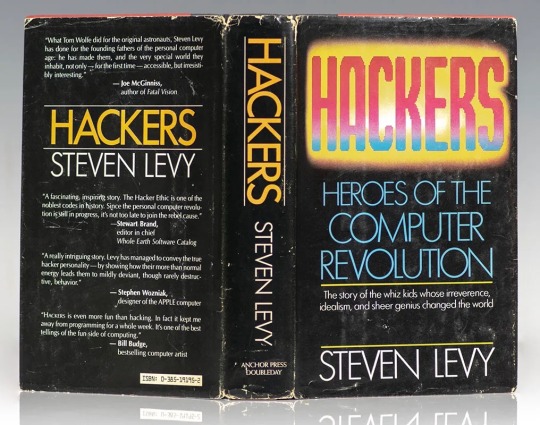
HACKERS: HEROES OF THE COMPUTER REVOLUTION | STEVEN LEVY, 1984
The ethics of a Hacker according to Levy:
Access to computers—and anything that might teach you something about the way the world works—should be unlimited and total.
All information should be free.
Hackers should be judged by their hacking, not bogus criteria such as degrees, age, race, or position.
You can create art and beauty on a computer.
Computers can change your life for the better.
166 notes
·
View notes
Text
today in "google AI is fucking useless because it hallucinates things that never happened", i bought a couple CVS thermometers that have both been acting up, tried to search if there had been a problem with the whole product line:
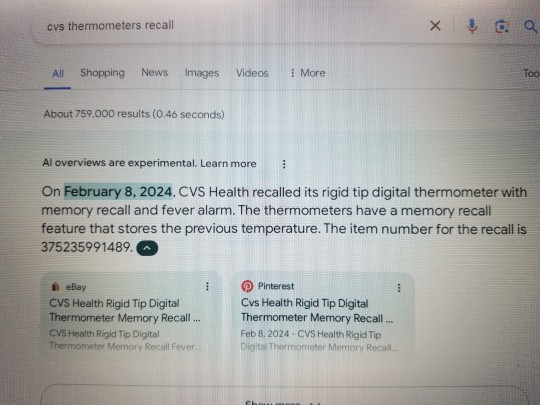
there is no record of this product recall. it did not happen. the date "feb 8 2024" is the date someone listed a thermometer for sale on ebay.
95K notes
·
View notes
Text
my friend and i were going to study a language together and wound up having to cancel our plans due to scheduling pressures, but! through research we came across a really cool resource for reading in a TON of languages: bloom library!
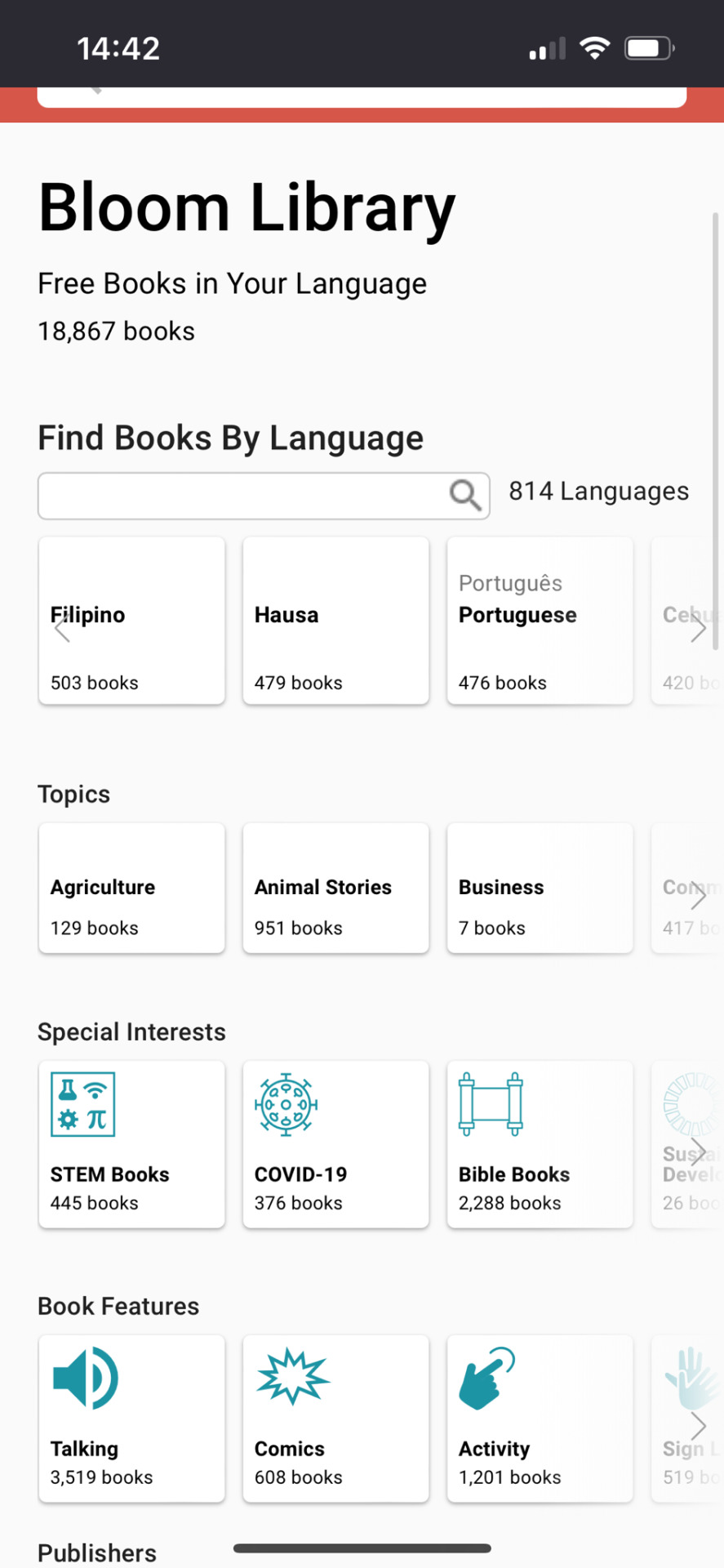
as you can see, it has a lot of books for languages that are usually a bit harder to find materials for—we were going to use it for kyrgyz, for example, which has over 1000 books, which was really hard to find textbook materials for otherwise. as you can see it also has books with audio options, which would be really useful for pronunciation checking. as far as i can tell, everything on the site is free as well.
7K notes
·
View notes
Text
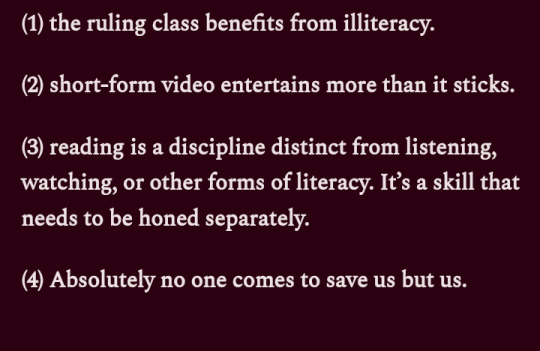
"Absolutely no one comes to save us but us."
Ismatu Gwendolyn, "you've been traumatized into hating reading (and it makes you easier to oppress)", from Threadings, on Substack [ID'd]
213K notes
·
View notes
Text
Study Strategies
For everyone asking "What does 'playing' with the material even mean when it comes to studying??"
Well, basically when you think about the material in a way that applies to your real life or interests, or that entertains you.
Writing a tumblr post about it (my blog started out as a study tool when I was in nursing school, because I re-wrote what I was learning in fandom/fic terms)
Talking about it or explaining it to a friend that is NOT in your field of study
Trapping your blorbos in a weird situation they can only get out of by learning the material (I once went through a whole scenario in my head about my blorbo getting injected with insulin and his friend having to figure out how long they had to give him sugar before they died to learn insulin onset-peak-duration)
Flash card "war" where 2 or more of your friends bring their flashcards and every time you or a friend puts down a card, the one that gets the answer the closest first wins the cards (google allowed)
Make a comedy routine about the material using only jokes that would be funny if someone understood it
Order a list of facts from least to most interesting- bonus points if you do it with a friend and you both have to agree, bringing your own arguments to the table as to why a particular fact deserves a certain rank
Finding an old textbook on the material at your school's library and figuring out what still holds up to today's knowledge
Find a group of people on the internet that are really interested in what you're studying and get the latest in DiscourseTM
Make the most misleading fact sheet you can make on the subject, with everything you say being technically true
Make a fact sheet that holds up to the reading comprehension of tumblr dot com
Basically anything that reframes studying from "I hate this and it takes up so much time" to "something I was probably going to do anyway for fun, but this time with more [subject]".
3K notes
·
View notes
Text
Change your Tumblr password now.
Humongous data breach just happened, with loads upon loads of sites being affected. Tumblr's among those. Also on the list is Wattpad for you fanfic people out there- among many, many other places.
There's a searchable list at the bottom of the article. Highly recommend scrolling or searching through, seeing what places you may be on that have been affected, and securing all your accounts. This thing's kind of big.
If you know people on any of the sites affected, let them know about this too, and spread the article around.
49K notes
·
View notes
Text
study methods


the second brain method
this method focuses on organizing the information you learn to maximize effectiveness. a common way of doing this is through the CODE method:
capture - be quick and efficient in how you receive the information
organize - organize the information in a way that works for you
distill - break the information down to its key elements
express - apply the information you’ve learned
* there is a ton of information out there about this method. if you struggle with burnout and knowing where to start, i recommend researching this method further to figure out what works for you.
the pomodoro method
the pomodoro method is a time management method. the most common expression of this method is to pick a task, work for 25 minutes on that task, then take a break for 5 minutes. then, repeat. if you’re planning to work all day, you may up the time spent studying. for example, after a while of this, you may work for 30 minutes at a time, then 40, then 45, and so forth. this method is particularly good for when you’re feeling unmotivated or having a hard time focusing. if you’re still not feeling it after a while, you may start to take longer breaks. for example, you may study for 30 minutes, break for 15, and keep going like that.
the 5 minute rule method
this method is good for when you have to do a shorter task, but you’re procrastinating doing it. this method requires you to dedicate only 5 minutes to do your task. after that, you may stop, but chances are, once you’ve started, finishing won’t be as difficult.
the blurting method
this method is particularly good for revision. the blurting method requires you to read over the content you are learning, then put it away and write down everything you know or can remember. then, check the content and revise everything you didn’t write down.
spaced repetition
spaced repetition requires you to spread out your study reviews over the period of a few days. this has been shown to improve memory. rather than studying one thing at a time, then studying something else the next day and so on, review the information right after you’ve learned it, then recall it after a few hours, then a few days, then a few weeks, and so on. if you’re studying something you will need to remember for an extended period of time, this method would be perfect for you!
active recall
this is my absolute favorite method! it’s been shown to improve your studying immensely and so many people have benefited from practicing active recall. active recall involves retrieving information from your brain, usually done through questions. a good way to do this is to explain the concept to yourself, to someone else, or act like you’re doing a presentation on the subject. after you’ve recalled all of the information you know about the subject, go over your material again and be sure you covered everything and explained everything the best way you could. if you didn’t, review everything you did not remember or got wrong, and go again. do this until you get everything. doing this can also be referred to as the feynman technique.
the SQ3r method
survey - skim your text and identify bolded text, headers, images, etc.
question - generate questions about the text based on what you surveyed. what are the key concepts in this text? what is each paragraph about? what information do i need to take away from this text?
read - read through the entire text and answer the questions you created
recite - summarize what you learned in your own words
review - recall the key concepts and answers to your questions
4K notes
·
View notes
Text
oops! it seems i tripped and dropped several million free books, papers, and other resources
https://annas-archive.org
https://sci-hub.se
https://z-lib.is
https://libgen.is
https://libgen.rs
https://www.pdfdrive.com
https://library.memoryoftheworld.org
https://monoskop.org/Monoskop
https://libcom.org
https://libretexts.org
http://classics.mit.edu
https://librivox.org
https://standardebooks.org
https://www.gutenberg.org
https://core.ac.uk
51K notes
·
View notes
Text
An important message to college students: Why you shouldn't use ChatGPT or other "AI" to write papers.
Here's the thing: Unlike plagiarism, where I can always find the exact source a student used, it's difficult to impossible to prove that a student used ChatGPT to write their paper. Which means I have to grade it as though the student wrote it.
So if your professor can't prove it, why shouldn't you use it?
Well, first off, it doesn't write good papers. Grading them as if the student did write it themself, so far I've given GPT-enhanced papers two Ds and an F.
If you're unlucky enough to get a professor like me, they've designed their assignments to be hard to plagiarize, which means they'll also be hard to get "AI" to write well. To get a good paper out of ChatGPT for my class, you'd have to write a prompt that's so long, with so many specifics, that you might as well just write the paper yourself.
ChatGPT absolutely loves to make broad, vague statements about, for example, what topics a book covers. Sadly for my students, I ask for specific examples from the book, and it's not so good at that. Nor is it good at explaining exactly why that example is connected to a concept from class. To get a good paper out of it, you'd have to have already identified the concepts you want to discuss and the relevant examples, and quite honestly if you can do that it'll be easier to write your own paper than to coax ChatGPT to write a decent paper.
The second reason you shouldn't do it?
IT WILL PUT YOUR PROFESSOR IN A REALLY FUCKING BAD MOOD. WHEN I'M IN A BAD MOOD I AM NOT GOING TO BE GENEROUS WITH MY GRADING.
I can't prove it's written by ChatGPT, but I can tell. It does not write like a college freshman. It writes like a professional copywriter churning out articles for a content farm. And much like a large language model, the more papers written by it I see, the better I get at identifying it, because it turns out there are certain phrases it really, really likes using.
Once I think you're using ChatGPT I will be extremely annoyed while I grade your paper. I will grade it as if you wrote it, but I will not grade it generously. I will not give you the benefit of the doubt if I'm not sure whether you understood a concept or not. I will not squint and try to understand how you thought two things are connected that I do not think are connected.
Moreover, I will continue to not feel generous when calculating your final grade for the class. Usually, if someone has been coming to class regularly all semester, turned things in on time, etc, then I might be willing to give them a tiny bit of help - round a 79.3% up to a B-, say. If you get a 79.3%, you will get your C+ and you'd better be thankful for it, because if you try to complain or claim you weren't using AI, I'll be letting the college's academic disciplinary committee decide what grade you should get.
Eventually my school will probably write actual guidelines for me to follow when I suspect use of AI, but for now, it's the wild west and it is in your best interest to avoid a showdown with me.
12K notes
·
View notes
Text
Things that will make your computer meaningfully faster:
Replacing a HDD with an SSD
Adding RAM
Graphics cards if you're nasty
Uninstalling resource hogs like Norton or McAfee (if you're using Windows then the built-in Windows Security is perfectly fine; if you're using a mac consider bitdefender as a free antivirus or eset as a less resource intensive paid option)
Customizing what runs on startup for your computer
Things that are likely to make internet browsing specifically meaningfully faster:
Installing firefox and setting it up with ublock origin
adding the Auto Tab Discard extension to firefox to sleep unused tabs so that they aren't constantly reloading
Closing some fucking tabs bud I'm sorry I know it hurts I'm guilty of this too
Things that will make your computer faster if you are actually having a problem:
Running malwarebytes and shutting down any malicious programs it finds.
Correcting disk utilization errors
Things that will make your computer superficially faster and may slightly improve your user experience temporarily:
Clearing cache and cookies on your browser
Restarting the computer
Changing your screen resolution
Uninstalling unused browser extensions
Things that do not actually make your computer faster:
Deleting files
Registry cleaners
Defragging your drive
Passively wishing that your computer was faster instead of actually just adding more fucking RAM.
This post is brought to you by the lady with the 7-year-old laptop that she refuses to leave overnight for us to run scans on or take apart so that we can put RAM in it and who insists on coming by for 30-minute visits hoping we can make her computer faster.
133K notes
·
View notes
Text
Best language learning tips & masterlists from other bloggers I’ve come across
(these posts are not my own!)
THE HOLY GRAIL of language learning (-> seriously tho, this is the BEST thing I’ve ever come across)
Tips:
Some language learning exercises and tips
20 Favorite Language Learning Tips
what should you be reading to maximize your language learning?
tips for learning a language (things i wish i knew before i started)
language learning and langblr tips
Tips on how to read in your target language for longer periods of time
Tips and inspiration from Fluent in 3 months by Benny Lewis
Tips for learning a sign language
Tips for relearning your second first language
How to:
how to self teach a new language
learning a language: how to
learning languages and how to make it fun
how to study languages
how to practice speaking in a foreign language
how to learn a language when you don’t know where to start
how to make a schedule for language learning
How to keep track of learning more than one language at the same time
Masterposts:
Language Study Master Post
Swedish Resources Masterpost
French Resouces Masterpost
Italian Resources Masterpost
Resource List for Learning German
Challenges:
Language-Sanctuary Langblr Challenge
language learning checkerboard challenge
Word lists:
2+ months of language learning prompts
list of words you need to know in your target language, in 3 levels
Other stuff:
bullet journal dedicated to language learning
over 400 language related youtube channels in 50+ languages
TED talks about language (learning)
Learning the Alien Languages of Star Trek
.
Feel free to reblog and add your own lists / masterlists!
17K notes
·
View notes
